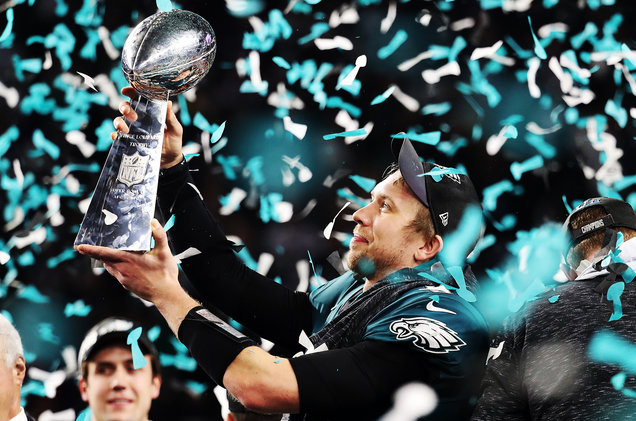Rejoice! The Philadelphia Eagles — champions of the downtrodden, slayers of dynasties, guardians of America’s first capital — have defeated Darth Vader and the Galactic Empire (sorry, I meant Tom Brady and the New England Patriots) to claim their first Lombardi trophy. It is the moment Eagles fans like myself have been dreaming about for, well, forever.
“So what?” you sigh. “I can’t stand football. The rules are confusing, and the games take ages. The NFL hid its concussion problem for years, and the league consistently discounts the demands of players and fans in favor of profit. Plus, you expect me to be happy for Philly fans? They threw snowballs at Santa! Oh, and also they burned down pretty much their entire city after they won.”
Although Philly is not the first city to engage in civic self-immolation as a victory celebration, I can’t deny many of these accusations. The NFL is in many ways predatory and often unabashedly so.
Yet despite the fact that I know football’s dark side, I am still obsessed with it. So are my dad, my uncle, my grandfather and most of my friends. Football, for all of its faults, is an undeniable social unifier. Beyond that, it represents an important vessel through which youth connect themselves to their community and their family.
Part of football’s power has to do with its strong narrative arc. Each team possesses its own anthology of tall tales and folklore and its own set of heroes and villains. Like a novel you just can’t put down, football draws you in and makes you cheer for your favorite characters, and it connects you with those who love these stories as much as you do. I was watching the Eagles with my dad before I could read. Sunday Night Football felt like a bedtime story. The indoctrination began so early that the passion feels innate and entirely inseparable from the one who branded me: my father.
My dad introduced me — a kid whose hometown fit inside a set of biannual cardboard moving boxes — to Philadelphia. He elevated a city known mostly for a boxer with an attitude and an above-average convenience store to a mythical land of childhood utopia, American working class grit and long-suffering but lovable sports teams. He showed me the eccentric characters of Donovan McNabb, Brian Westbrook, Terrell Owens and now Nick Foles. He shared with me the (limited) triumphs and the (many) heartbreaks that each new Eagles’ season brought. And he told me his own stories: the first time his dad (my grandpa) passed down stories of the Eagles to him when he was a small boy in South Jersey, looking across the river to the big city. Those hometown heroes became an extension of himself.
At a certain point, I began to feel as though the fact that I wasn’t from Philadelphia limited how much of an Eagles fan I could claim to be. Football became less of an interest, and I opted to spend my Sundays playing video games or hanging out with friends instead. But this year, watching my first Super Bowl away from home, I wanted nothing more than to be on the couch with my dad.
Every play, I checked my phone to see if he had texted me his reaction. I watched my sister’s Snapchats, featuring his manic celebrations and exasperated groans. And I smiled ecstatically, eyes a little wet, when I saw the video of him all decked out in green, hands on top of his head, his face red with disbelief as the whistle blew. I was happy, but at the same time, I felt a tinge of sadness. For an Eagles fan, Super Bowl LII was the Deathly Hallows and the Return of the King all wrapped into one. I realized that celebrating a Super Bowl victory has little to do with your own personal connection to a team, and everything to do with your personal connection to those who share the triumph with you. It’s a proxy for interpersonal bonding. It took an Eagles Super Bowl ring for me to understand that football is inseparable from who I am and how I identify with others.
I understand that football is very, very flawed. I will be the first to say that there must be a push for a safer, cleaner and more responsible game in the future. Yet there is still value in football, even in its current form. It unifies. All sports do. But football holds an unmatched prevalence within the American cultural landscape; even with the drop in ratings this year, 20 of the 30 top watched TV programs in 2017 were football games. The debate should not be about whether football should be discarded. It should be over how it can be bettered. The TV might show you rowdy Philly fans tearing down street lights, but what it doesn’t show you are the happy tears shed in the company of family. I guarantee you that those tears run deeper than a flying pigskin.
Zach Goodwin is an undeclared first year. He can be reached at zgoodwin@oxy.edu.
![]()




































